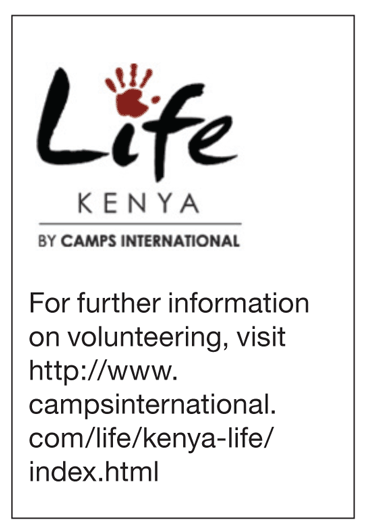Volunteering overseas to make a difference
Words: Emma Edwards, RGN
Words: Emma Edwards, RGN
Tavyside Health Centre, Tavistock, Devon
Pictures: Jenny Beck, RGN
MOD, Larkhill, Wilstshire
Practice nurse Emma Edwards found her UK experience equipped her well for some of the things she encountered in Kenya — but not all by any means
I answered a post from a colleague on an on-line practice nurse forum...'Who would like to take a 2 week gap "year" working in rural Kenya?'
Fourteen months later I was flying out with almost 2 dozen people I had never met, but who would soon become lifelong friends.
Over 8 clinic days we managed to see just short of 8000 patients! We concentrated on three aspects — worming adults and children, jigger treatments and free consultations with free prescriptions.
Malnutrition is highly prevalent, and people often resort to eating soil because they are so hungry, tummies become bloated and painful and full of worms so every person we saw was given worming tablets and their details recorded to give to the Kenya government.
The jigger programme was the most physical treatment. Jiggers are pregnant fleas that burrow under the skin (mostly hands and feet) and enlarge and lay eggs, the 'jigger' becomes a maggot size and eats away at the flesh under the skin. This becomes extremely painful and eventually people become unable to walk. This problem can be avoided by use of flip flops but most of the population are to poor to own any.
Feet and hands are washed in carbolic soap and then soaked for 15 minutes in potassium permanganate to kill the jigger, and then moisturiser is rubbed in to block the jigger's breathing holes just to make sure they are dead. Bear in mind that the queue for this was usually about 200 people and all water had to be pumped from the well because there is no running water.
Pictured is one of the better feet, the others are much to graphic to print"¦ and all that is needed is a pair of flip flops.
Some aspects of healthcare are free but come with huge stigma. For example, treatment for TB and HIV are free but people are reluctant to access help because of being ostracised from the community. Routine healthcare has to be paid for and if they can't afford a pair of flip flops they are unlikely to be able to afford to see a doctor in a private clinic.
The free clinics that we provided were the first of their kind and were so appreciated by the local community: some of the children were a little apprehensive at first, but they soon got used to us driving around in our 4 ton truck and the kids loved to run up and greet us, shouting 'Jambo! Jambo!'
Between the three or four of us doing consultations, we averaged around 300 patients a day. Each patient usually had three or four items prescribed, making pharmacy an extremely busy job to be doing.
Malaria was the dominant illness seen and one day in particular was extremely emotional. It started with a child having convulsions due to malaria and ended with us running out of drugs to treat malaria and having to send very ill patients away in the hope that they would be able to attend the next clinic, and hoping that we would be able to source more drugs"¦ the day started and ended in tears.
We had no idea what was going to be expected of us and the locals who ran our camp had no idea whether or not we would be able to cope with our surroundings, living within the community and the type of patients that we would be seeing, but they were so proud of what we achieved. We have built amazing relations with the local healthcare providers and the local communities which will enable us to be much more prepared and organised for next time"¦yes there will definitely be a next time!
It was the most emotional, life-changing, life-affirming two weeks of my life and I can't wait to return to Makongeni (for the third time) in November this year.
Related articles
View all Articles
